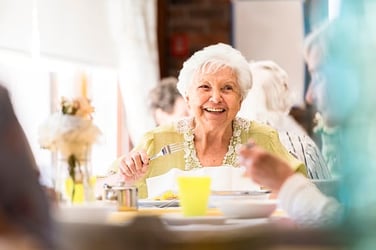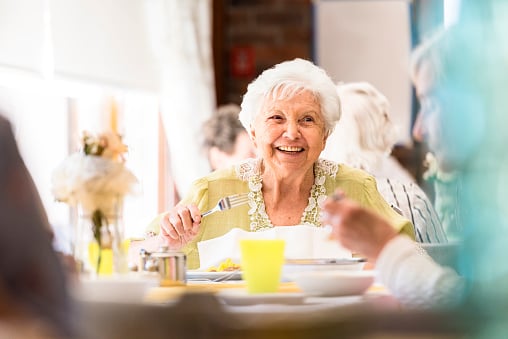As we age, our level of appetite tends to dissipate. This doesn’t always necessarily mean there’s some serious medical issue at play; appetite changes over time - and that’s perfectly okay. In fact, there are plenty of reasons why an older individual will not have the same eating habits as they did when they were younger. From lack of energy to changing taste buds and dehydration, the causes of a fading appetite in seniors is important to note so they may still get the nutrients they need
Fading Appetite in Seniors
 A loss of appetite in older adults is not uncommon; it’s simply a natural part of aging. So no, you don’t always need to concern yourself if a loved one doesn’t always finish their plate. However, more severe problems may arise with senior citizens who aren’t consuming the nutrients they need on a consistent basis.
A loss of appetite in older adults is not uncommon; it’s simply a natural part of aging. So no, you don’t always need to concern yourself if a loved one doesn’t always finish their plate. However, more severe problems may arise with senior citizens who aren’t consuming the nutrients they need on a consistent basis.
Perhaps you are familiar with some of these cases for disinterest in eating more, perhaps not. Regardless, if this is all entirely new to you or if it’s just a refresher, it’s a good idea to know why seniors lose their appetite over time. Below are some reasons why:
Seniors Don’t Have as much Energy
Let’s face it; we all have less energy as we get older. Yes, there are exceptions and ways to keep up your metabolism and physical activity. But in general, older people tend to live a less active lifestyle. And it’s a circular effect: the less energy you have, the less you will exercise, and vise-
This overall lack of energy can affect their willingness to go into the kitchen and cook. And the lack of motivation to prep your own meals can often lead to malnutrition in people. It takes time and energy to stand over a counter for an hour or two. And that’s just for one meal.
Taste Buds Have Changed
Do you remember when you were a kid and you hated onions? Now you love them. And the truth is, you may not always love them. Our taste buds transition over time, changing what we like and dislike. And furthermore, your ability to taste may diminish as you age. It’s all part of growing older. You can lose your sense of taste and smell - and these two senses are at the heart of deciding what you prefer to eat and drink. Without them, you may have a hard time deciphering your tasting preferences; this leads to a lack of interest in eating.
Imagine when you were asked to close your eyes, plug your nose, and eating what was in front of you. Was it an apple? An onion? You probably couldn’t tell. And if you can’t tell what the differences are in eating, then you lose pleasure it this pastime.
They’re Dehydrated
Dehydration can cause a loss of appetite. Older individuals who don’t consume enough fluids on a daily basis can become dehydrated. What’s more, age-related body changes and medications can increase this effect. Health problems can also play a role in causing dehydration in seniors. Some of these include:
- Lowered blood pressure
- Kidney stones
- Blood clots
Ensuring seniors are maintaining equilibrium for the fluids in their body is important for them to not only stay healthy but so they may also keep their appetite.
Seniors Have a Difficult Time Chewing
Over time, senior citizens can develop problems with chewing their food. This may be from normal wear and tear on the body, but it can also be caused by certain factors:
- Prescribed medications
- Dental problems
- Surgery
If someone is having difficulty chewing, they may no longer find pleasure in eating - leading to a loss of appetite. On top of these specific reasons for people having a hard time chewing their food, it can also be caused by certain medical factors.
Health Conditions
Seniors are going to have more health issues, in general, than younger individuals. It’s part of getting older. And in some cases with certain health conditions, they can cause a lack of appetite. Some of these specific illnesses are:
- Alzheimer’s Disease
- Parkinson’s Disease
- Gum Disease
- Cancer
If you or someone you know hasn’t been up to eating much recently, it’s important to see a doctor and rule out some of these potentially life-threatening diseases.
But of course, this is not always the case. It may be something as simple as a person’s access to food or their diet restrictions that are affecting their appetite.
4 Ways to Appeal to Diet Restrictions
There are many ways to help older individuals receive more nutrients for their daily intake. And it doesn’t necessarily mean them stuffing their faces with more food; it’s not always the right answer. Below are some ways a senior citizen can regain their appetite so they may continue to stay healthy and enjoy some of life’s many pleasures:
1. Increase the Number of Nutrients, not Portion Size
Size isn’t everything. Increasing a person’s portion size for meals will, in fact, provide more nutrients, but it doesn’t mean everyone is able to do this. An excellent alternative is to upsize their nutrition intake instead. This can be done by eating nutrient-rich foods like avocados, olive oil, or peanut butter.
2. Maintain a Consistent Eating Schedule
Are they eating when they should? A lack of consistency in their meals can make it difficult for them to find an appetite. Make slow changes, not all at once. Add a small snack for them here, add a larger-sized cup of juice there. It’s all about a slow and progressive change so that their body may make the adjustments it needs to obtain a healthy and regular eating schedule.
3. Push for Social Eating
Inevitably, people become less social as they get older because there’s not always a need to go to work or get up and do something outside of your living quarters. Seniors and everyone for that matter crave social connections. After all, we’re all social creatures. Eating alone can decrease your appetite. Push for social meals. It’ll likely increase their level of eating.
4. Provide Senior-Friendly Food and Drink Options
A lot of older individuals move into a senior care community. There’s no point in developing ways to increase your appetite if you move into a facility that doesn’t offer the options you want and need. That’s where Bernick’s comes in.
Bernick’s Partners with the Senior Community
Our team at Bernick’s partners with senior living care facilities around Central Minnesota. We understand the importance of providing quality food and drink options, whether that’s for businesses or retirement care communities.
Because serving meals is about bringing people together to cultivate this sense of community. The quality of options for seniors contributes to their sense of what a welcoming and friendly atmosphere the facility has. And they’re likely going to be living there for a fair amount of time. It’s important that they enjoy themselves.
Referring back to the need of getting senior citizens on a consistent eating schedule, it’s important to provide just that. And it all starts in the kitchen - with precision and responsiveness of staff and food and drink available on-hand. Provide the right nutritional benefits for senior citizens - they deserve it.
Our team at Bernick’s believes in assisting seniors with their nutritional wants and needs so they may enjoy this stage of their life.




